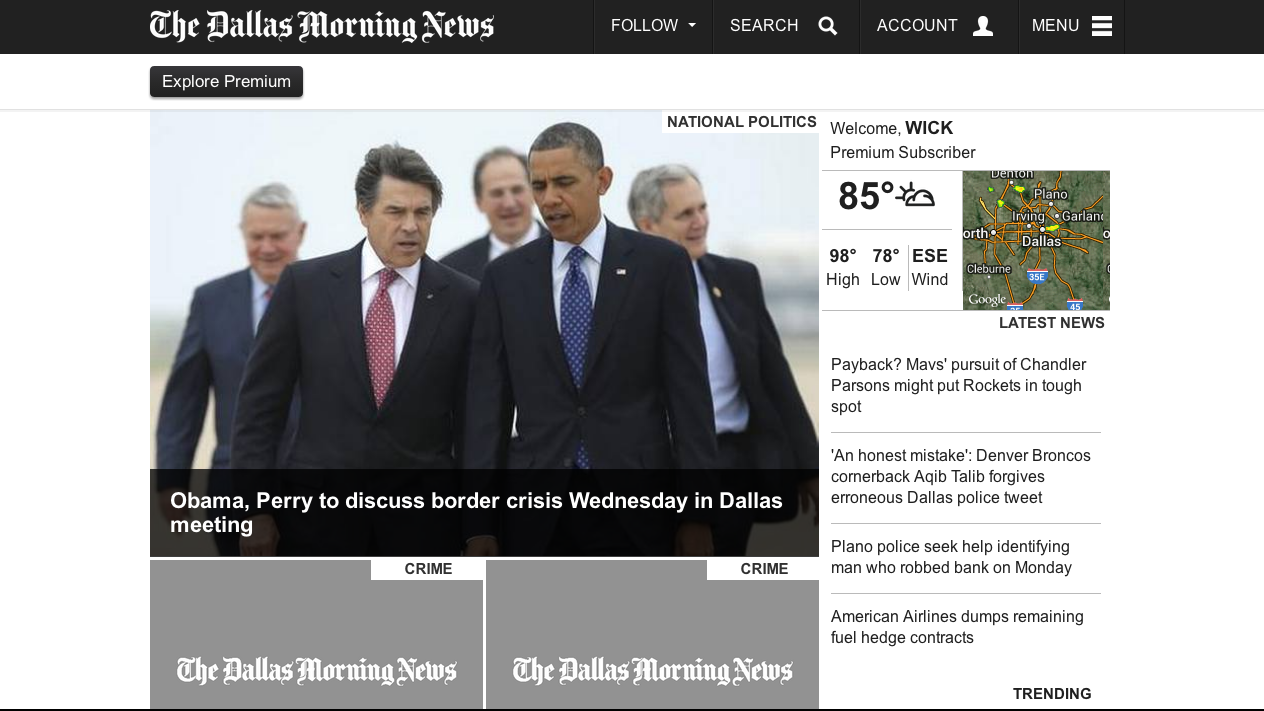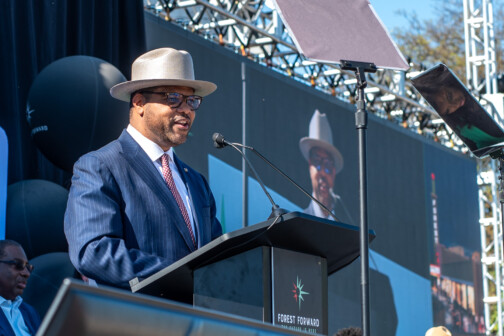When I read this morning that the Dallas Morning News is giving up on its “premium content” experience (which it launched last fall), my first reaction was to think “they’re still offering a premium content experience?” I have a subscriber’s log-in that I could use to access the site, but many months ago I stopped bothering to do so because the time it took to type in the email address and password wasn’t worth the payoff.
I wouldn’t do as the Morning News’ own story today has done and categorize this experience as a failed attempt at premium content. I’d instead think of it as an “incomplete,” given that there wasn’t anything terribly “premium” about the Morning News experience.
There wasn’t any bonus, subscriber-only content. All it meant was seeing the site via a drab design that made the homepage a grid of Pinterest-y tiled photos, and when it first launched the navigation was a disaster. It was difficult to access any story that wasn’t immediately presented in that photo-centric grid. While they have made improvements since then, it’s still much easier to move about the site on the non-subscriber version — even with the annoyance of ads that subscribers can avoid. So why would anyone pay $11.96 a month for a lesser experience? It seemed not much of an incentive for print subscribers to stay print subscribers either.
Apparently it wasn’t, which is why they’re giving up after less than a year. This should concern all of us who believe in the importance of a healthy news media to the life of thriving city. We should applaud the Morning News for having tried something new because something new has got to be tried. The solely advertiser-supported model of online media isn’t working at a scale that will support any organization throwing as much manpower and as many resources at a story as the Morning News can today.
As significant as has been the growth in online revenue for outlets like the Morning News (and for D Magazine), we wouldn’t be able to finance our operations without print. Which is why the decline in newspaper print readership is so concerning for the industry.
From a free-press perspective, the Internet is a marvelous thing because it affords nearly anyone a printing press of their own. From an ad revenue perspective, the Internet is a dastardly thing because it affords nearly anyone a printing press. The online pie is having to be divided far too many ways, resulting in ad rates that can’t sustain a large, profitable news-gathering business on their own. And that’s not even factoring in the way sites like Google and Facebook skim huge chunks of the potential revenue off the top.
We have to get readers to pay for the content they want. We’re going to have to. I doubt greatly that the Morning News, in ending this experiment, has completely abandoned that fact. They’re just going to look for another means of doing it. In which case, I have a proposal.
Right now most of the World Wide Web is like over-the-air broadcast television, freely available to anyone with a computer and an ISP (the equivalent of a TV and an antenna.) I think the problem with the model that the Morning News has just given up on, and which newspapers like the New York Times have also attempted and abandoned, is that they’re asking readers to take a channel that they had been receiving for free and to pay for it like it’s HBO, a premium service.
Newspapers are, at best, basic cable. If you lost access to Bravo, you’d probably adapt quickly and just end up watching a lot more A&E. Likewise, if you’re cut off from the New York Times, you’re just switching over to the Washington Post. So that’s the approach that needs to be taken: a bundle rather than an a la carte selection. All of the country’s major news outlets would have to band together online under a single programming package for which readers would pay a unified monthly fee. The key is that it’d have to involve such an overwhelming chunk of North American news outlets that readers would have no choice but to pay for the access if they want to consume the content. Unless a reader has no other way to get at the news, they’re aren’t going to pay up. (So, yes, we’d have to confront how to handle aggregation by other sites, like Buzzfeed and the Huffington Post. Maybe they’d be invited to the table too?)
Totally unfeasible, right? Given how many corporations are involved, how they’re are bound to be disagreements about how revenue should be shared, and the technical hurdles involved in setting a one-size-fits-all paywall across websites developed on many different systems, probably.
But how about a local experiment? The Morning News and D and the Star-Telegram and the Observer and all the local TV stations should create something like a Dallas-Fort Worth Online News Network, work together to create a paywall structure for all the sites, agree to a revenue split that’s based on average traffic of each, and give it a shot. Invite along the smaller outlets too, like the Star Community Newspapers. None of us individually has a monopoly on Dallas news, but collectively we do.
How much would you pay for monthly online access to Dallas-Fort Worth news? That’s worth something, isn’t it? I mean, if you’re forced to pay up (and, in this case, that’s what we’d be doing.) Readers who still want a la carte offerings can still watch the local news broadcasts or pick up D or the Morning News on newsstands.
We’d reach an agreement to do this for a set period time, but it’d have to be an all-for-one, one-for-all proposition. It’ll implicitly teach readers to place some monetary value on the local news. Which is what we must do. So, Morning News folks, have your business people call our business people.
(N.B.: This harebrained proposal is entirely of my own concoction. It is not one of Wick’s harebrained schemes that he’s asked me to back-channel to the Morning News via a seemingly tossed-off blog post. If you’re wondering what I stand to gain from any of this, besides the potential for a sustainable and healthier media job market, I’m sure Wick and I can reach an agreeable commission structure for my contribution.)






